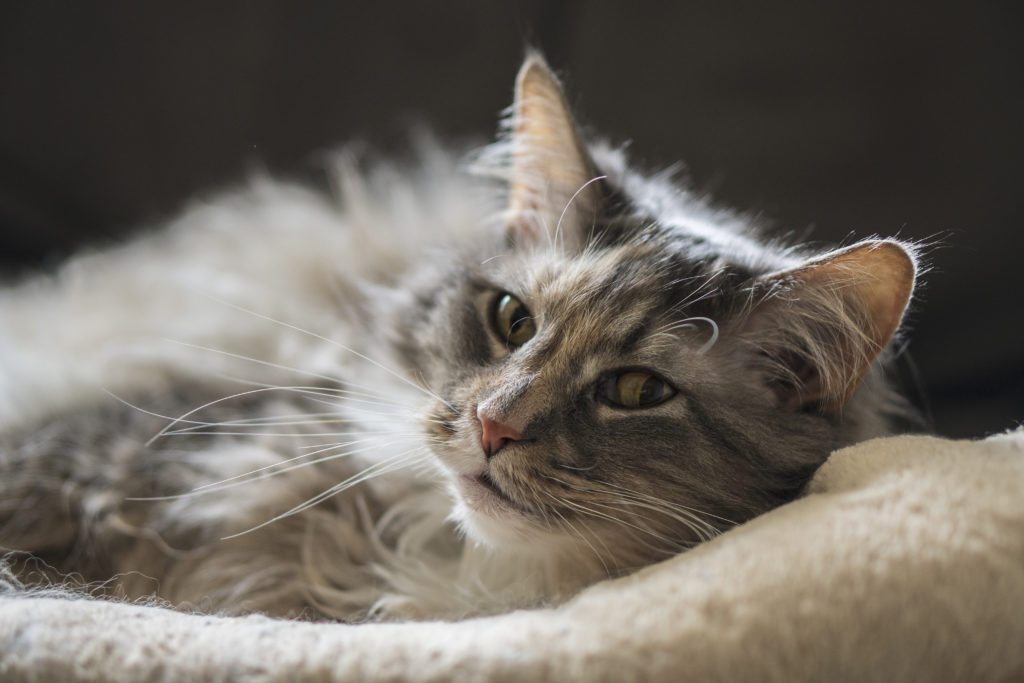In popular culture (especially cartoons), cats are often shown coughing up hairballs—usually in a humorous light. But when the cat in question is your feline friend and he’s coughing up blood, the situation calls for a more serious response.
Hematemesis, or vomiting blood, is a potentially serious medical condition that requires immediate attention. But just why is your cat vomiting blood and what can you do about it? Read on to find out.
How Can I Tell if My Cat is Vomiting Blood?
You may think a cat vomiting blood is easy to spot, but blood does not always appear as you’d expect. In obvious instances, the blood will appear as fresh red streaks, which points to the stomach or upper part of the small intestine as the source. Partially digested blood, on the other hand, looks like coffee grounds and comes from lower in the intestines.
Other symptoms of a cat vomiting blood include:
- Fatigue
- Lack of appetite
- Abnormal stool, including diarrhea
If blood is passing through the stool, blood from the colon will appear fresh; tarry or sticky if from the upper intestinal tract or stomach.
Why is My Cat Vomiting Blood?
There are several possible reasons your cat could be vomiting blood.
Possible causes of a cat vomiting blood include:
- Chronic severe vomiting
- Infection—bacterial or viral
- Toxic ingestion or exposure to certain plants and/or heavy metals
- Foreign matter in the intestinal tract, including hairballs
- Parasites, such as heartworms
- Other medical issues, such as kidney or liver disease
- Stomach ulcers
- Clotting disorders, which can be caused by ingesting rat poison
- Trauma to the gastrointestinal tract, for instance, from swallowing bones or other foreign objects
What Are the Risks Involved?
Hematemesis, or the vomiting of blood, can affect several systems depending on the source:
- The gastrointestinal system may be compromised due to trauma, ulcers, inflammation, or the ingestion of harmful matter.
- Clotting disorder can lead to a hemorrhage in the stomach or the intestines, which can also lead to hematemesis.
- A hemorrhage may be involved and affect the heart, the cardiovascular system, leading to a heart murmur and/or low blood pressure. A hemorrhage may also cause abnormally rapid breathing.
- The lining of the esophagus, the tube connecting the mouth to the stomach, may become disrupted. This could lead to inflammation, bleeding, and vomiting of blood.
- Finally, hematemesis may also point to an inflammation or injury to the mouth or the lungs. The cat may then swallow this blood before throwing it up.
What Do I Do if My Cat is Vomiting Blood?
If your cat is vomiting blood, call your vet right away. The veterinarian will want to determine the underlying cause in order to provide the correct plan of treatment.
Your veterinarian may also want to run a variety of tests, including blood tests or urine and fecal analyses. Imaging tests, such as an ultrasound and X-ray, may also help expose inner disturbances.
What Treatment is Available?
Now that your veterinarian has pinpointed the cause of why your cat is vomiting blood, he can better prescribe a proper plan of treatment.
If an underlying cause, such as a foreign object, is discovered, the vet will want to have this removed. Once this cause is identified and removed, if vomiting is no longer abnormal, you may be able to help your cat recover with rest at home.
More severe cases, on the other hand, will require in-patient care: emergency treatment for hemorrhage or shock; blood transfusions, if necessary; even IV treatment to help replace the fluids lost through vomiting.
The road to recovery for a cat with hematemesis includes a delicate diet of easy-to-digest foods. Your vet may prescribe a diet of foods low in dietary fat and low in fiber, which are easier on the digestive system. Be sure to follow this diet, and any follow-up instructions, to aid the recovery.
Is There Any Way to Prevent Hematemesis?
Vomiting blood is often caused by external stressors, like toxic substances. Working with your vet to identify and remove commonly overlooked plants, foods, and other substances toxic to animals is recommended for any pet owner.
The right diet is also helpful in preventing illnesses related to hematemesis and related complications.






